|
Watching my parents and in-laws become grandparents has been one of the greatest joys that has accompanied my having nieces and nephews and becoming a parent. I appreciate the relationship I have with my parents and in-laws in many ways, but I truly delight in seeing the relationship they have with my 3- and 4-year-old. The love and affection they demonstrate to my kids is tender, unique, and boundless. I am constantly amazed by their generosity and patience as they kindly agree to read book after book after book, go to the park, build an elaborate block structure, or watch my kids’ favorite show. Their hospitality and thoughtfulness shines through when they bring out the stash of toys they keep on hand just for them or plan special meals, always taking care to include all my kids’ favorite menu items. Not only do my parents and in-laws make my kids feel deeply loved in these day-to-day activities, but I can also tell how they are helping form them into the people I hope my kids will be. On occasions where I feel the need to discipline or scold my children, their grandparents are able to offer gentle correction and kind guidance. They don’t resort to force or bribery; they simply offer heartfelt advice and wisdom from their own experience. By praying with and for them, they serve as witnesses of deep faith. By sharing family stories, they preserve our shared memories, history, and roots. By offering to watch the kids so that my husband and I can get away for a bit, they provide much-appreciated support. As I muse over the time my kids spend with their grandparents, it makes me wonder what Jesus’ relationship with his grandparents was like. That is one of the many reasons I enjoy celebrating today’s feast of Saints Joachim and Anne, parents of the Blessed Virgin Mary and grandparents of Jesus. (Another reason is that my daughter, Ana, was named both for St. Anne and for my husband’s grandmother, who was born on this day). My imagination sets a scene of Jesus enjoying some of his grandmother’s home baked goods in the kitchen or out for a walk on the hilly countryside with his grandfather. Surely, they enjoyed quality time with their beloved grandson, caring for him with watchful eyes, holding him as he sat on their knees, and soothing his hurts or anxieties as only a grandparent’s unique perspective and calm can. In a World Youth Day message, Pope Francis describes how, “Saints Joachim and Anne were part of a long chain of people who had transmitted their faith and love for God, expressed in the warmth and love of family life, down to Mary, who received the Son of God in her womb and who gave him to the world, to us. How precious is the family as the privileged place for transmitting the faith! ... How important grandparents are for family life, for passing on the human and religious heritage which is so essential for each and every society! How important it is to have intergenerational exchanges and dialogue, especially within the context of the family…This relationship and this dialogue between generations is a treasure to be preserved and strengthened!” (Angelus, XXVIII World Youth Day, July 26, 2013). I have come to appreciate this treasure more and more as I try to respond to the Holy Father’s invitation to prioritize time with grandparents and the elderly. Besides speaking on several occasions of his own close relationship with his own grandmother, Pope Francis just last year established the celebration of the World Day for Grandparents and Elderly on the fourth Sunday of July, near today’s feast. In his message for this second occasion of its celebration, Pope Francis extols the virtues of grandparents and the elderly as “teachers of a way of life that is peaceful and attentive to those in greatest need”, “artisans of the revolution of tenderness in our world”, and “poets of prayer”. I recognize and admire these and many other qualities in my parents and in-laws. On this feast, my prayer is filled with joy and gratitude for the great gift my children have in their grandparents. I hope that they cherish the time they spend with their grandparents and value their example of love and witness of faith as I do. And I pray for the intercession of Saints Anne and Joachim, that my family will continue to be filled with this great love that spans generations.
1 Comment
During my formative years, I had the distinct privilege of spending time with my grandads and even one great-grandad. In the late 1950’s and ‘60’s, our pace of life and activities was very different from today. We attended school and church, but a lot of our time was centered around our home. Even more unique were our regular visits with extended family on a weekly basis. This afforded me time to be in the company of my grandparents frequently. I listened to their talk about work and how they solved problems and the things that occupied their time. I enjoyed accompanying my dad’s dad on outings to pick blackberries and then had the pleasure of helping in the process to make wine in his cellar. My Grandpop was a nuts-and-bolts kind of man, always busy with his work as caretaker of the cemetery, keeping their only vehicle (an old Ford truck) running, and maintaining the house where he and my grandmom raised thirteen children. It was fascinating learning things from him. I would follow him around and help load coal into their furnace and collect items from the cool cellar that housed their canned vegetables and held Grandpop’s workbench. He liked to show any of us grandkids the things he did for work, as well as the projects he worked on, such as building cedar benches for anyone who wanted one and making wine from the fruits he picked. They lived a hop, skip and a jump from the monastery church and school where they walked to 6am daily Mass. By society’s standards, Pop was minimally educated and made a meager wage that kept them in the lower economic level their entire lives. The gifts we received were hand-made and simple, but lots of time was invested in being family together. I loved being in Grandpop’s shadow and considered the cemetery near their house to be the most magical place in my world with its little streams and bridges and huge fir trees and rolling hills. Amongst those resting in peace, my dad and his twelve siblings grew up under the tutelage of my grandpop’s calloused hands and the soft-spoken voice of my grandmom. My grandmom’s parents lived just three blocks away, and my great-granddad was a successful stone mason with a shop full of heavy, rough-hewn tools that carved important information into big pieces of granite for the deceased. As an adult, I realize how fortunate I was to have enjoyed weekly visits to my great-grandparents. Great-granddad was a tall, polite, and loving man. He would sit me atop a piece of stone and include me in the conversations with my dad and other family. He had two framed pictures over the desk in his shop – the Sacred Heart of Jesus and the Immaculate Heart of Mary. As a kid, I always felt that they were watching me. These images hanging in a prominent place in his shop spoke volumes about the faith my great-granddad had. No matter how busy he was, he had a way of making me feel cherished when we came by. And a visit never ended until he sent us up to the house to get a drink and a slice of cake from great-grandmom. My mom’s dad was another wonderful grandfather with whom I spent much time while growing up. (I never met my grandmom because she died suddenly only three months after my parents were married.) Pop was a tall, handsome man who always wore a suit, and I mean always! He was retired from the phone company and had raised five children through the Depression era. His parents and aunt lived with them in a small but comfortable row home. Most of my time spent with Pop was at our house where he would come most days in the afternoons and stay through dinner. Sometimes we would pick him up at his apartment and I loved seeing his stuff. He was an avid follower of the Baltimore City Fire Department and had a squawk box to hear all the fire calls. He had boxes with index cards full of information on the different fire houses, calls, and each fireman. When my mom was growing up, he would pile the kids in his car and they would go watch the firemen fight fires. He supported the firemen with visits and gifts and had a deep respect for what they did for the community. I loved sitting at his feet in our living room listening to him tell stories of growing up in Baltimore and of his family. He was a regular member at our dinner table in his later years and always took an interest in my studies and in the things I was doing. When my parents would go away on their annual business trip, Pop would come take charge of our household. He made flapjacks for breakfast, walked me to the school bus stop and would meet me there each afternoon. I didn’t need an escort, but it was his way of sending me off. He played cards with us and told stories and made the best stew I’ve ever eaten! He made sure to remind me to say my prayers and he took us to church. Pop was present for all the holidays throughout the years, along with a lot of aunts, uncles, and cousins. Our house was the typical gathering place for my mom’s siblings and so I guess that’s why Pop always came over. In his later years when he could no longer drive, my parents wanted him to move in with us, but he insisted on his own independence and lived out his days, until he died at 89, in his apartment. As a kid, I never thought twice about Pop always being at our home. As an adult, I look back and see the treasure I had in being loved by a man who had all the time in the world to talk. It impacted me more than I realized. Mom and dad took care of the needs of the family, but Pop took the time to share himself with me and take an interest in what I was thinking as a young girl trying to figure out what was important in life. A generation removed, Pop made it abundantly clear how important each member of the family was to him, which instilled in me a strong desire for continued close family bonds in my adult life. I then watched how my dad became granddad to my six children. He was busy seven days a week and lots of nights running his business and providing for our family when I was a child, but as a granddad, he learned how to switch gears and devote attention to his grandchildren through time spent together. He took his role as grand patriarch seriously and lived out sharing the gospel of Jesus with all his grands in very simple but tangible ways. He was a great encourager of all the pursuits of each one and never hesitated to share his testimony of how God helped him on a daily basis to do what he was supposed to do. He shared prayers and taught them the power of talking with God all day long. And when my parents visited for two to three weeks each Christmas season, everyone could see how he laid out his days. He would be seen in a quiet chair early in the mornings with his well-worn prayer book praying his prayers. Then he and mom would attend morning Mass with any of us who would accompany them. He joined in our family prayer time and nightly Rosary. I have also enjoyed witnessing my husband embrace the role of Pops to our sweet grandchildren. He rejoices in the gift of each one and prays daily for them to always hear and respond to God’s call on their lives. He loves playing with them and particularly sharing his love of music with them. The treasure of knowing my granddads and being so loved by them has been a gift in my life that I know has helped me understand the love God our Father has for me. The beauty of the continuous bond from great-grandfather to grandfather to father is powerful and assures me of my heritage. The greatest lesson I learned from these loving men was to invest yourself in others and especially to build up and encourage each member. It doesn’t seem mighty or grand, but it strengthens the foundation of our lives and nurtures deep, holy growth in our specific God-ordained purpose. The richness of a grandfather’s love and care is a gift in the family. Their patriarchal leadership and security are God’s design for how families are enjoined together through the generations and meant to relate. I have had the privilege of this delightful heritage and my prayer is that it will continue to be nourished by the fathers to come in our family. For more resources on Marriage and Family, please click here. To learn more about the Year of St. Joseph, please click here. **This post was originally published on 7/27/2021** 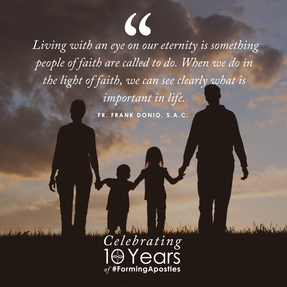 “At times family life is challenged by the death of a loved one. We cannot fail to offer the light of faith as a support to families going through this experience. To turn our backs on a grieving family would show a lack of mercy, mean the loss of a pastoral opportunity, and close the door to other efforts of evangelization.” - Pope Francis (Amoris Laetitia, 253) Each life includes death. This is obvious, but lack of consideration of the topic is part of the culture of some parts of the world, particularly the United States. Yet, death occurs. Living with an eye on our eternity is something people of faith are called to do. When we do in the light of faith, we can see clearly what is important in life. Much of our time is spent in all sorts of activities. Are these helping us grow in holiness? Do they cause us to love God and love neighbor in deeper and more profound ways? If our answer is no, then as apostles of Christ, it is time for us to reevaluate where and how we use our time on this side of life. The other side of life, eternity, will come very soon. Pope Francis also invites people of faith to assist families who have experienced death. It is a prime pastoral and evangelization opportunity, not in a heavy-handed way, but in one that accompanies people in their time of grief and beyond. If they are distant from the community of faith, the death of someone in their family offers a space for compassion, love, and care by missionary disciples of Christ. Doing it right at the time of death is good but walking with families long beyond that time is true spiritual accompaniment. May the Charity of Christ urge us on! In God, the Infinite Love, Fr. Frank
I’d like to use this opportunity to talk a bit about my husband, who may be wildly embarrassed that I’m using him as my muse for this post. My husband works hard. He is a very predictable man, sure of himself, and resolute in his decisions. He uses humor to make light of situations and balances out my whimsical optimism with his reality-based thinking most days. But an admirable quality that he’s had since before we met is that he has an intrinsic motivation toward duty. He is a man of purpose. I love him for it all and am proud of all he’s done in service to others. Plus, I’m certain I don’t tell him that enough. So here it is, publicly acknowledged and acclaimed!
When I reflect on the men I know, I often see a sense of duty and purpose driving many of their decisions and commitments. Not only men are often dutiful, but many take pride in what they do. I’d like to reflect on this sense of purpose through the lens of the saints and Scripture. We find men of God in Scripture who did great things and were called for a purpose like Abraham and Saul. We find holy men among the saints who were called to a sense of duty like St. Peter and Blessed Father Michael McGivney. These men were each very different, lived at different times, and were challenged by God in different ways. Each one was called with a duty to serve and be faithful, too. They were men of purpose. We know the stories from the Old Testament about Abraham and how he was chosen by God to be the “Father of Many Nations,” how he was blessed in his old age with a child, and how he was faithful to the point of sacrificing his son. God chose him to make a covenant with, and he will forever be remembered for his steadfast obedience to the Lord. We also know the story of Saul, who persecuted Christians, endorsing stoning and doing terrible things in God’s name. Then one day, a bright light knocked him down and he was blind until he converted and believed in Christ. On that day, his name was changed to Paul, and he became a missionary who traveled all over bringing with him the Word of God. Both men were called by God and were given a purpose. There are two other holy men I’d like to consider as well, the first being St. Peter. I like to think about his example because every time I read about Peter in Scripture, he seems to lack purpose until Jesus speaks to him. At the Transfiguration, Peter’s first thought is “let’s build tents” when he sees Moses and Elijah with the Lord and he hears God’s voice in a cloud that says, “This is my Son…Listen to Him!” (Matthew 17: 1-9). Later, in the Garden of Gethsemane when Jesus is arrested, Peter acts on impulse and cuts off the ear of a servant until Christ tells him, ‘Put your sword away!” (John 18:10). Throughout the Gospels, Peter seems so relatable. Although well-intentioned, he often says or does things out of turn. It is after the Resurrection when Jesus forgives him and tells him to, “Feed My Lambs…Tend My Sheep…Feed My Sheep” (John 21: 15-17), that he is entrusted to be the first pope with the help of the Holy Spirit. He was taught by and learned from Jesus, and now he is ready to be the leader he was intended to be. Jesus gave purpose. The fourth man of purpose I’d like to consider has a bit of significance to our family: Blessed Father Michael McGivney. Fr. McGivney was born in Waterbury, CT in 1852 and grew up in an immigrant Catholic household. Later, he became a seminarian and then a beloved parish priest at St. Mary’s in New Haven where he walked with people in their daily lives. A man of purpose himself, he recognized the hardworking men in his community and started the Knights of Columbus in 1882 as a fraternal organization of Catholic men. He knew that, united in faith, these Catholic men could be invigorated to help their communities and the order grew. Fast forward over a century, and lay men both young and old are still pining for purpose and the Knights of Columbus has provided that for so many. Most importantly in my life, my husband has found faith, fraternity, and unity in his work through this organization and I’m proud that he’s found such a calling for service as a Knight. Blessed Father Michael McGivney provided him and countless other men with purpose. At a time when so many things seem to be challenging our Catholic faith, there are ways we can keep on persevering and people who we can rely on for help. Look to those who are resolute. Look to the ones who have never wavered, to those with faith. Faith provides this duty and purpose. It comes out in a variety of ways, as shown in the examples of the many men I’ve reflected on here. We all are looking for purpose--whether it’s a small child finding purpose in helping around the house or a new member of the Knights of Columbus hoping to find purpose in fraternity and service. I challenge you to reflect on the examples of men of purpose I shared and consider what Christ is asking of you today. Where do you find purpose? “Be a Person for Others” - St. Ignatius of Loyola. “Seek God and you will find God. Seek God in all things and you will find God in all things. Seek God always and you will find God always.” - St. Vincent Pallotti And the greatest purpose of all: “Love one another as I have loved you.” (John 15:12) A few weeks ago, I wrote about Bl. Pier Georgio Frassati. In reading about him, I also came across St. Kateri Tekawitha as another patron saint of World Youth Day (WYD). I quickly delved into her fascinating life. A woman who defied others to remain true to her beliefs, St. Kateri Tekakwitha has become known as the “Lily of the Mohawks.”
St. Kateri Tekakwitha was born in 1656 to a Mohawk father and a Christian Algonquin mother in what is now upstate New York, near Albany. While a young girl, Kateri contracted smallpox. Although she survived the disease, she was left with poor eyesight and scars on her face and eyes. Because of this, she was given the name "Tekakwitha," which in Mohawk means, "She bumps into things." When she was 8 years old, her foster family arranged for Kateri to be betrothed, as per Iroquois tradition. Kateri refused to marry, stating that she wanted to dedicate her life to God. At the age of 18, she started to learn more about the Christian faith through Jesuit missionary Father Jacques de Lamberville. Her uncle eventually gave her permission to become a Christian as long as she did not leave the village. Kateri began incorporating aboriginal concepts into her understanding of Christianity, such as the presence of God in nature. At the age of 21, Kateri was baptized and received First Holy Communion on Christmas Day in 1677. After being rejected by her community for her conversion, she walked to the St. Francis Xavier Mission near Montreal, Canada, to join a community of Native American women who had also converted to Christianity. Kateri, who attributed her name to Catherine of Siena at the time of her baptism, died on April 17th, 1680. Tradition holds that her dying words were "Jesus, I love you” and that after her death, the scars on Kateri’s body began to heal—restoring the radiant appearance of her face. She was canonized on October 21st, 2012 by Pope Benedict XVI in Rome. She has been named the Protectress of Canada and patroness of the environment, environmentalists, Native Americans, and several diocese, to name a few. As someone who is interested in Native American culture and the environment, I enjoyed learning about Kateri and her dedication to the natural world and her faith. I was also surprised to learn that she was the first Native American saint in the Catholic Church. It was interesting to learn about her dedication and devotion to her faith, even when it meant rejection from her community. Kateri bravely stayed firm to her belief in Christ when she was pressured to reject her faith in Christ and adhere to the traditional native beliefs. She knew that her faith in Jesus was not misplaced, so these demands only reaffirmed her beliefs. Kateri blended her faith in Christ with a respect for nature. She maintained a deep devotion to nature and its beauty after her conversion. In his second encyclical, Laudato Si, Pope Francis emphasized the imminent need of protecting the environment. I also invite you to imitate Kateri’s respect of nature. I have personally found this greater call of environmentalism to be reinvigorating. As the world’s young people prepare to gather in Poland for WYD, we realize in a special way that we are all on this planet together. We are called to see how our actions affect the world, and that we can work together for a stronger response to protect God’s great gift of creation. The air, water, trees, birds, plants, and other animals are not confined to national borders and neither should our approach to protecting the earth. Kateri inspires me to take action to protect the environment. If we each do our part by recycling, taking public transportation, and keeping vigilant about our energy consumption, then we have a greater chance of protecting our world. In addition, we are called to educate ourselves by reading more about environmental issues. I recommend starting with Laudato Si. As we pass down our faith from generation to generation, so do we also pass down our responsibility towards this Earth. It can be hard to keep in mind that this is the same Earth that Jesus Christ walked on. Kateri, “Lily of the Mohawks,” combines this love of nature and Christ. It is my hope, as we approach WYD later this month, that we will also consider how we are protecting the environment. May we be inspired by this phenomenal saint. To learn more about St. Kateri Tekakwitha, click here. For more information on World Youth Day 2016, click here. **This post was originally published on 7/14/2016**
“Therefore, since we have been justified by faith, we have peace with God through our Lord Jesus Christ, through whom we have gained access [by faith] to this grace in which we stand, and we boast in hope of the glory of God. Not only that, but we even boast of our afflictions, knowing that affliction produces endurance, and endurance, proven character, and proven character, hope, and hope does not disappoint, because the love of God has been poured out into our hearts through the holy Spirit that has been given to us.”--Romans 5:1-5
Many of us are taught from a young age that Jesus loves us, stands with us, and listens to our prayers. This reality is easy to accept intellectually but hard to know in one’s heart. As one matures through adolescence and adulthood, troubles seem to build and anxieties can begin to overwhelm. Despite our faith and love in Christ, a deafening silence and perceived sense of loneliness can invade one’s spiritual life. This can occur in a myriad of situations, but I have noticed it is especially common when people experience some sort of transition in their life. By its very nature, dramatic change disrupts routines and occupies the mind with a million more questions than on more “typical” days. Being worried and focused on other aspects of life makes it harder to see and know Jesus in these day-to-day moments. In addition, world events like natural disasters or instances of social or political upheaval can push many members of the faithful into periods of doubt and questioning. The key to getting through these “gray” moments in our spiritual life is through perseverance in the face of doubt, questions, and anxiety. One must dive deep into the moments of grayness in order to come to a better realization of who Jesus is and what true love and faith looks like. Before I continue, however, I want to say that this perseverance is not a perfect problem solver. Instead, taking one step at a time in the spiritual life despite a gray cloud or pall that seems to be hovering over you can be the means to continuing your faith and deepening your relationship with Christ. It is not a quick fix that will make you feel better in a day or two. Rather, perseverance is a method of faith development that looks different for each person. The key to all of this is consistency. Many saints experienced periods of spiritual drought, doubting, and dark nights of the soul (a term coined by St. John of the Cross). Most famously, St. Mother Teresa of Calcutta experienced decades of “hunger for God,” and “the terrible feeling of being ‘unwanted’ by Him.” St. Teresa arguably saw some of the ugliest facets of human life and society, and any person who was ministering to the poorest of the poor would feel some form of burnout and depression. Many Christians today experience these same emotions in their own faith journeys, and instead of giving up and letting go, one must do the counter-intuitive action and cling to Christ more. Although I understand that this sounds cliché, bringing one’s raw questions, emotions, fears, and doubts to Jesus—whether at Mass, Adoration, or even in the car—can help one come to resolutions. Prayer is defined in the Catechism as “the raising of one's mind and heart to God,” and since our hearts are all unique, our prayers to Jesus in “grey” moments look different (CCC 2559). You must find a form of prayer that helps you draw as close to Christ as possible. This prayer can be Adoration with journaling, a Rosary with meditation, talking with friends or a spiritual mentor, or even venting to God aloud when you are home alone. The most crucial part of these moments is that you are praying and talking to God. Lastly, these hard times are normal in the spiritual life. Countless saints have experienced them, and thousands of Catholics are in the midst of them every day. When one enters into these dark nights, one must cling to Christ in the hope that comes from afflictions as St. Paul says in his Letter to the Romans. As St. John of the Cross also says, trust that “in the dark night of the soul, bright flows the river of God.”
Throughout this July, we have the lives of three blesseds we can look to for inspiration in these modern times. All three of these blesseds lived during the 1900s and experienced many of the same ups and downs that we may face today. Today, we celebrate Bl. Maria Romero Meneses who lived from 1902-1977 and ministered in Nicaragua and Costa Rica. Then, on July 28th we will celebrate Bl. Stanley Rother who was born in Oklahoma in 1935 and martyred in Guatemala in 1981. Finally, on July 30th we will celebrate Bl. Solanus Casey, a Capuchin who lived from 1870 until 1957 and ministered in New York and Detroit for much of his life. The lives of all three of these blesseds can help guide us today. Bl. Maria Romero Meneses Bl. Maria Romero Meneses was born in Nicaragua in 1902 and in her youth, she became extremely sick, but after her arduous recovery, she committed herself to becoming a religious sister. She joined the Salesian Sisters when she was 27 and was transferred to Costa Rica where she completed most of her ministry. She focused on both helping the poor in her community and helping the rich understand how they could help those who were struggling. In today’s world, I find it can be easy to silo ourselves or others to just doing one thing, but, Bl. Maria is an example to us of helping those in need while also trying to help the structural causes of their need. While most of us won’t have the opportunity to work and minister in places like Nicaragua and Costa Rica, let us pray for Bl. Maria’s intercession for guidance on how to help the poor in our community and help change the structures that lead to poverty. Bl. Stanley Rother Bl. Stanley Rother was born in 1935 in Oklahoma. He became a priest for the Archdiocese of Oklahoma City and in 1968 was assigned to the Oklahoma mission to Guatemala with the Tzʼutujil people. While in Guatemala, Bl. Stanley did more than just preach, he founded a radio station and a hospital, taught language lessons, and did whatever else he could for the Tzʼutujil people. He even taught himself Spanish and the Tzʼutujil language so he could best minister and be present to the people there. Bl. Stanley ended up being killed during the Guatemalan Civil War because his missionary work put him in the middle of the two sides. One lesson I have learned from Bl. Stanley is how we can minister to people in so many ways, not just through preaching. He learned the Tzʼutujil language not just to preach, but so he could engage with the Tzʼutujil in their day-to-day life and be present to them. Bl. Solanus Casey On July 30th we will close out the month by celebrating the feast of Bl. Solanus Casey. Bl. Solanus was born in 1870 and entered the Capuchins around the turn of the century. He spent the first twenty years of his ministry in New York and then in 1924 was transferred to Detroit. While in Detroit, he mainly served as a porter at the Capuchin monastery. Even as he did the relatively simple task of a porter, Bl. Solanus was attentive to the visitors to the monastery and would pray with and for them for their illnesses and other hardships. He was renowned for his special Masses celebrated for the sick and people would travel just for these Masses with Bl. Solanus. I find the example of Bl. Solanus as the porter inspiring in our world today. He had a simple task, but he did it very intentionally and with great love, bringing many people closer to Christ. May we all pray for the intercession of Bl. Solanus to do our tasks with the same great intentionality and love! As we continue through this July, let us pray for the intercession of Bl. Maria Romero Meneses, Bl. Stanley Rother, and Bl. Solanus Casey as we strive to grow closer to Christ and bring other to Him. To learn more about the saints, visit our Catholic Feast Days Website by clicking here. To view a calendar of the feast days in July, and each month, click here.
Growing up in the Catholic Church, I never thought much about going to religious education classes. They were simply something I went to for an hour after Mass. During this time, I would meet people from very similar backgrounds--we lived in the same area and were the same age. Never did I think about why we were there; we just were. This past year, I decided to help teach RCIA at The Catholic University of America. While the class was all around my age - all were undergraduate students- we came from different lives. One person went to another university in the area and went to school in Africa, another was a part of the deaf community, and others were just trying to figure out who they were in terms of their faith. I was in a religious education environment I had never been in before. Not only was I on the other side teaching, but everyone also had different life experiences. When finally meeting these candidates and talking about our pasts, I realized that I was not only a teacher, I was also a student. Every week, the class discussed something new. I was by far no expert on any of the topics. For example, explaining the Holy Trinity was beyond my scope, but I managed to use St. Patrick’s explanation of the three-leaf clover. The candidates knew I was a student at CUA, not even studying theology who was just trying to share my faith experience. I was grateful that they had patience with my fumbling over words and trying to Google explanations when I couldn’t formulate one myself. Through these struggles, we grew together--listening to each other and what we thought about topics. Each person would bring stories that I would have never heard elsewhere. Most importantly, they brought their newfound belief in God and the Catholic Church and why they were in the class. I knew why I was in the classroom: to help teach and spread the Word of God. However, every person had a personal journey. One student in particular amazed me. He knew God had called him to be Catholic. He had his confirmation name picked out for years and was so excited to share it with the priest at the Easter Vigil. As St. Thérèse of Lisieux said, “Our Lord needs from us neither great deeds nor profound thoughts. Neither intelligence nor talents. He cherishes simplicity.” This student brought exactly this to every class. When discussing why God forgives us of our sins, he would just say, “Why wouldn’t He? He loves us.” This took me aback. When looking at the discussion questions for the week, I tried to find Bible verses and stories of Jesus’ forgiveness. But God did not need to prove his forgiveness, he just had to acknowledge that he always loves us and will forgive us. Experiences like these, where we take a step back and look at our faith, often show us we need to learn more-this is when a teacher becomes a student. In the future, I hope to continue sharing my faith with those who wish to know more. However, instead of trying to be the teacher, I will listen more carefully and learn from everyone around me. Jesus is in all of us, and if we listen hard enough, we can find him in every person.
I have a new hot-take: Jesus is a perfect definition of bittersweetness. This might leave some to continue scrolling down the page, but hang on. For me, I need to connect to my faith in a tangible and simple way. When you think of something like the Paschal Mystery, it’s a little daunting. To explain some more, let’s break down this little claim of mine and engage with the Paschal Mystery a bit. We know that Jesus’ Passion, death on the Cross, rising from the dead, and new life are all aspects of the core of what we believe as Catholics. The bittersweet aspect is that it was both sad and amazing at the same time. Recently, we saw how Jesus’ Passion and Resurrection, followed by his Ascension, made his disciples miss him. But, the Holy Spirit empowered them to do great things! At points of transition in our lives, even as natural as the change of seasons, we may find ourselves with feelings of similar bittersweetness.
As my life gets pretty chaotic this summer, I’m finding myself constantly split between being sad and happy or experiencing the closing and opening of chapters. I’ll be saying a fond farewell to an aspect of my career that feels like the sun setting, but there is hope of new and exciting horizons that lie ahead. As a parent, I’m grieving the baby phase that my two-and-a-half-year-old is through and gaze at his baby chub that was so squishy, when he couldn’t run fast. On the other hand, I’m loving the chatting and curiosity that his toddler age has brought to our lives and I can’t stop laughing and smiling with him lately! Also in my personal life, my husband and I are coming up on our 5th wedding anniversary this fall, and I cannot help but wonder how fast the time has flown by while loving how much we’ve grown and supported each other over these years. In all of these areas, the word I keep thinking is not bittersweet—that sounds like a tasty chocolate. It’s bittersweetness. The word for my summer is bittersweetness. I think I like the sound of it better than the type of chocolate because of the “sweetness” part. I like the sweetness in things, the joy and the happiness. I tend to skip right through the sad or longing because if I dwell on these too long, I’ll get that tightening in my throat and catch a tear in my eye. I don’t like goodbyes and I don’t like endings. I always think of the glass half-full. For example, I tell my students, “Jesus died, but three days later he rose from the dead and saved us all.” The bittersweetness of life for me always looks optimistic and emphasizes the sweetness, not the bitterness. But life is full of both, so I’m trying to push through and feel all the feels this time. In this literal new season of summer and this transition of seasons in my life, I need this reminder to not skip the goodbyes and try to go straight to the good part. I think this summer will be hard for me in this season, so turning to prayer and God’s grace will ease that burden a bit. I’ve always found comfort in prayer, whether it is an intentional Mass or journaling some thoughts. I’m hoping to re-acclimate my heart for those things too. For at-my-fingertips-access though, I am also going to attempt to make the Revive and Rekindle App through the Catholic Apostolate Center a daily habit. I’ll first begin with the daily reflections and see what my heart needs next. I need to reflect and think about Christ, and I really enjoy doing so through the lens of Pallottine spirituality. I find comfort in the words of St. Vincet Pallotti: “Seek God and you will find God. Seek God in all things and you will find God in all things. Seek God always and you will find God always.” He reminds us to simply look for the Lord. I’m hoping this “seeking,” will bring some comfort for me and for you! Through Christ, this bittersweetness may open my eyes to new things or help me feel at peace with both emotions, embracing the bittersweetness together! Prayer will get me through. Lord, give me strength and understanding. Amen. As we conclude this June, we will celebrate four saints over three days who were crucial during the early days of the Church. Yesterday we celebrated St. Cyril of Alexandria. Today we celebrate St. Irenaeus. Tomorrow we will celebrate Sts. Peter and Paul. All these saints were instrumental in the spreading of the Gospel and in the formation of the Church during its first few centuries. Even though they lived long ago, their lives carry many messages for us today. St. Cyril of Alexandria St. Cyril was the bishop of Alexandria in the beginning of the 400s when the city was powerful politically and intellectually. Throughout his life, St. Cyril of Alexandria faced many political conflicts with other bishops, the patriarch of Constantinople, and the Roman emperor. However, even through these challenging situations, he remained steadfast in his faith and was a proliferous theological writer. Today he is counted among the Church Fathers and Doctors of the Church. One of the teachings of St. Cyril of Alexandria that has always stuck with me is his defense of Mary under the title of “Theotokos.” Theotokos roughly translates to “Mother of God” or “God-bearer” and has been a title of Mary in the Church, especially in Eastern churches, since the time of St. Cyril. Some of my favorite icons of Mary represent her as Theotokos and have really helped me grasp St. Cyril of Alexandria’s teaching. St. Irenaeus Today we celebrate the feast of St. Irenaeus. St. Irenaeus was a bishop in the 2nd century known during his lifetime as one of the last living connections to the Apostles. Like St. Cyril of Alexandria, St. Irenaeus was a prolific theologian who helped guide the Church through many theological controversies and heresies, most notably Gnosticism. For this theological impact on the Church, St. Iraneus was named a Doctor of the Church (just earlier this year by Pope Francis). If you like the nitty-gritty of theology, I encourage you to read more about St. Irenaeus. For me, the quote from St. Irenaeus that has had the biggest impact on my life is: “the glory of God is man fully alive.” I always found the word fully particularly inspiring. I connected this with John 10:10, “a thief comes only to steal and slaughter and destroy; I have come so that they might have life and have it more abundantly.” Throughout our life, in both the big events and the mundane events of day-to-day life, Jesus is calling us to full, abundant life. Sts. Peter and Paul Tomorrow we will celebrate the solemnity of Sts. Peter and Paul. Unlike a majority of saint’s feast days, the feast of Sts. Peter and Paul is celebrated as a solemnity as a sign of their importance to the early days of the faith. While there are many elements of the lives of Sts. Peter and Paul that could be explored, I have always found it striking that they are celebrated on the same day. After St. Paul’s conversion, St. Peter was in a very challenging position that took strong leadership guided by the Holy Spirit to navigate welcoming Paul into the community he once sought to kill. Then, throughout their time working together, they frequently did not see eye to eye on the important issues they faced. Yet, through their disagreements they kept the greater good of the Church in mind and both ended up being martyred for the faith. In our day and age, I think we all can learn a lot from the leadership and collaboration guided by the Holy Spirit exemplified by Sts. Peter and Paul, even when we do not necessarily get along with the people we are working with. Let us always pray for the intercession of St. Cyril of Alexandria, St. Irenaeus, and Sts. Peter and Paul as we strive to learn from their example and bring Christ to those in our lives. To learn more about the saints, visit our Catholic Feast Days Website by clicking here. To view a calendar of the feast days in June, and each month, click here.
God reveals Himself to us and carries out the work of our salvation through becoming a man. He takes on our human condition; He gives us His love and enables us to act with that same love. This is the infinite love that God Himself is.
The message Jesus gives to St. Margaret Mary Alacoque, a simple nun in late sixteenth-century France, follows this same story of God’s infinite love. That is, divine love comes to us through Christ, who takes on our own human flesh, and has a human heart. This love desires nothing short of our salvation and sanctification. The humanity of Christ is necessary for our reception of God’s infinite love, and for our ability to live out that love in our own lives. Jesus and His Sacred Heart are the image of God, the infinite love. Why does it matter that God becomes a man? First and foremost, because we are God’s living image. With the gift of human choice and freedom, God enables us to become a more perfect image of Himself (God, The Infinite Love, p. 91). Through the fall, humankind rejects, disobeys, and forsakes God–our creator and model. We are in need of salvation. So, God, in His infinite love, loves us so much and desires to save us–to restore us towards perfection as His living image–that He takes on our flesh, our human nature, and gives us the gift of a perfect living image of Himself. The words of St. Vincent Pallotti remind us of the greatness of this gift: “Oh my God, my infinite and incomprehensible love, my eternal, infinite, immense and ineffable mercy, what moved You to grant me such a gift but your infinite love, infinitely merciful?” (God, The Infinite Love, p. 84). The gift of God’s infinite love is poured forth through Jesus Christ. We know that for any human, the heart is the source of good and evil, love and unlove (Luke 6:45). So, for Christ, fully God and fully man, His Sacred Heart is the source of God’s infinite love for the whole world and all humankind. The humanity of Jesus–especially the model of His Sacred Heart–changes our hearts and allows us to live our lives with the infinite love of God. Pallotti writes, “Jesus sanctifies, improves and enriches, with His infinite merits, all the words, thoughts and deeds of our life” (God, The Infinite Love 99). God has revealed Himself to us and saved us, through sending Himself. Jesus Christ, the Word become flesh, models for us how to be living images of the infinite love that is God Father, Son, and Holy Spirit. In our daily lives, we are called to be conformed unto Christ, and to be the images of infinite love which we were created to be–for ourselves and for others. Let us do so through modeling our hearts, words, thoughts, deeds–and thus our whole lives–after Jesus Christ and His Sacred Heart. St. Vincent Pallotti. God, The Infinite Love. Translated by Flavian Bonifazi, S.A.C. Baltimore, MD: Pallottine Heritage Center. 1967. 6/21/2022 Part Three: Fully Initiated- Learning and Living our Faith through the Order of Christian Initiation of AdultsRead NowIn this third and final part to this Blog series (See Part One and Part Two), I will discuss the final stages of OCIA (Order of Christian Initiation of Adults) and how the shifted paradigm I’ve been describing has helped us foster a mentality of full initiation—initiation through the sacraments into the Parish Community and Universal Church—as the true goal of becoming Catholic. I also want to conclude with a heartbreaking but redemptive story of what this year leading our new Catholics into the Church has meant to me. Stage Three: The Period of Purification and Enlightenment The transition from Stage Two into Stage Three is marked by a special liturgy at the cathedral known as the Rite of Election. The candidates/catechumens are now referred to as “the Elect.” The Period of Purification and Enlightenment, the final preparatory phase leading up to the celebration of the Sacrament of Initiation at the Easter Vigil, coincides with the Lenten Season and focuses on penance—Prayer, Fasting, and Almsgiving—that provides the necessary spiritual and moral formation to worthily enter into full communion with the Catholic Church. Recall that in Stage One (Evangelization/Precatechumenate) we met each week in class and in Stage Two (Catechumenate) we did not, and instead prescribed various active “missions” to be completed by the candidate/catechumen and their companion/mentor. Our approach to the Period of Purification and Enlightenment is done as a combination of the previous two stages. That is, we begin to meet again each Monday evening to cover topics like 1) What is the Sacrament of Penance and Anointing? What is Catholic Morality? What is Catholic Social Teaching?, but I also give a new set of “Missions” for the candidate/sponsor as well. This year they included:
This year we had folks read things like C.S. Lewis’ The Screwtape Letters, Fulton Sheen’s The World’s First Love, Dorothy Day’s The Long Loneliness, Pope Francis’ Laudato Si, and then share an insight with the group. We also took another Lenten Pilgrimage Day (this time at the Franciscan Monastery of the Holy Land and National Shrine of the Immaculate Conception in Washington, DC). By the end of Stage Three, participants have gotten a pretty good faith workout! They have experienced first-hand enough of the Catholic faith—its liturgy, prayer, sacred places, works of mercy and charity—to make a well-formed decision to enter into full communion at Easter. And it is with Easter joy that Mother Church receives them and we gain new brothers and sisters in Christ. The Easter Fire and Paschal Candle symbolizes the Great Light of Christ’s Resurrection, the light that each of us has received to bring His radiant joy and warmth into an often dark and cold world. Stage Four: The Period of Mystagogy We cannot forget the fourth and final stage of OCIA, the Period of Mystagogy, which does not signify an end but another beginning. Our Mystagogy sessions further introduce three themes: 1) Mystagogy, 2) Ministry, and 3) Mission. We look back (on the sacraments received) in order to look forward-- How does this grace send me forth to build up the Body of Christ (Ministry) and share the Good News (Mission)? In other words, faith spreads and grows one way only, from Light to Light. Conclusion The last story I want to share is not a “success” story that somehow proves the effectiveness of a new strategy or paradigm. It simply tells the relentless love of Christ, the power and working of the Holy Spirit, and the beautiful communion of belonging the Church offers in the midst of the pain of our shared journey of faith. It’s not a story I would have hoped to tell, but it tells me there is always reason for hope. During Stage Two (the Catechumenate), the candidate and their sponsor gradually read through the entire Gospel of Matthew. One day one of the sponsors, a young man named Kevin (we’re actually the same age), asked to come see me at the parish office. When he came in, he began to describe what can only be described as a great conversion in his life (he had a challenging past) as he read the Conversion of Matthew story (Matt 9:9-13). While he was supposedly being a mentor and guide for the catechumen, it was incredible to see how being a sponsor, which made him get back to coming to Mass each week and reading the Gospel himself, touched off something profound and life-changing. He met the Lord in a new way, returned to the sacraments, and set about his continued conversion. The Easter Vigil for him and his companion (and new Catholic) was an occasion for joy I won’t forget. A couple weeks after the Easter Vigil there was an accident at Kevin’s work, a machinery explosion that resulted in him suffering extreme burns and internal trauma. Some other priests and I were able to offer the Anointing of the Sick in the hospital. For three weeks he fought for his life, undergoing multiple critical surgeries, until the Lord relieved him of his suffering and called him home. I had the honor of presiding his funeral, the largest I’ve ever been involved in. I knew the “missions” he had done with his companion, that he went to Mass, read the Scriptures and the Screwtape Letters, prayed the Rosary, toured our cathedral, and more. For someone who had been through a lot in life already, it leaves me speechless still to witness how in that relatively short period of time leading up to a tragic event that no one could have predicted, this “modern-day St. Matthew” found reconciliation with the Lord and passed on his faith to another in the time he was given. I pray he has now moved on to that truly final “stage” of our Christian pilgrimage towards full communion in Christ, from this dim earthly light below to that blessed and eternal light of heaven. This is a story of belonging, what all of our ministries should be about. “On the way of wisdom I direct you, I lead you on straightforward paths. When you walk, your step will not be impeded, and should you run, you will not stumble.” - Proverbs 4:11-12 Some of my fondest memories of my childhood are those with my dad. I grew up in Massachusetts, and I remember mulling around the Cape for a beach day, going into Boston to catch a game, or running to whatever sporting event I had that weekend. Being an only child, I was extremely close with both of my parents. We were a little trio, and did everything together. When I think of my dad, I not only think of all the fun memories we had, but I also think of all the life lessons I learned along the way—three of which I will go into detail about. Perseverance: From a young age, I saw the work ethic and determination my father had and looked up to him for that. Being a CPA, he was always working late hours and working on weekends. We knew when tax season hit that he was at his busiest. Despite this, my dad never missed a school concert, a soccer game (or even a practice for that matter), or a dance recital. If it was important to me, it was just as important to him. I can still remember him saying to me sternly, “Never, never, never give up”. No matter what was going on in my life, how upset I may have been, or how frustrated I was, that phrase was said many, many times throughout my life and I still call upon it during moments of doubt. Through crying at the dinner table trying to complete math homework, going through a rough patch with friends, or struggling through college applications, my dad would always remind me to never give up, that the Lord would always show me what was right for me. Knowledge: As I continue to reflect on phrases I learned from my dad, the other one that always pops into my mind is, “knowledge is power.” He used this phrase so much that he even has it engraved on a bookmark! While education and schooling were extremely important to my childhood, I knew he meant this phrase more broadly. We always talked through current events, explored new sections of the library, and tried to learn as much about anything and everything as possible. This allowed me to stay curious about the world around me, to never be satisfied with one answer, and to always search out the next. I think it’s also probably why I became a history major, as I have always loved to research. After a long week of work, my parents would wake up very early every Saturday morning and drive me an hour into the North End of Boston to take Italian language lessons. Thinking back on that now, I can see their commitment and self-sacrifice (instead of choosing to sleep in on a Saturday morning) to my global knowledge and taking every opportunity to learn something new. Faith: Another large aspect of my childhood revolved around faith. I can remember being a young child and not enjoying going to Mass. I was too young to understand the importance of what was going on in the Mass. While most of my friends were not Catholic, I couldn’t understand why I had to go. Instead of making me sit there and pout, my family tried to make the weekly Mass have some “fun” aspects to it. Whether it be squeezing hands at the end of the Our Father, getting Dunkin Donuts’ together at the end of Mass, or having me put our weekly donation into the basket, these fun little moments allowed my four-year-old faith to begin to grow. A man of great faith, my dad made sure I never missed a weekly Mass or a CCD class and remained involved in our Church community. My dad remained positive through all facets of life - often reminding me that God always had a plan, a path for each of us, and to follow in His guidance. Looking back, I am so grateful for the memories that I have made with my father over the years, and I am looking forward to the new memories that we will make now and in the future. I will always cherish the moments that we share together and will take his life lessons with me through every step of my life. To learn more about different facets of fatherhood, we invite you to visit our Year of St. Joseph Resource Page.
Ah, summer. The sun is shining. The beach is calling. There’s much more time for leisure (which is so important! Read Pieper if you need convincing.). For me, more leisure means more time to read and write and consequently, more time to explore the beauty of our faith.
Here’s what I’m reading this summer:
2. Four Quartets by T.S. Eliot Speaking of works I will revisit for the rest of my life, I read Four Quartets multiple times a year, including every summer. I mentioned this genius work in a previous blog, and must bring it up again. This four-part poem from Eliot isn’t the lightest read, but there are plenty of commentaries out there for guidance. I recommend Dove Descending: A Journey into T.S. Eliot’s Four Quartets. Written after his conversion, Four Quartets can be read as a response to Eliot’s earlier, more famous and more despondent poem, The Wasteland. Whereas The Wasteland wonders whether a life of harmony and wholeness is possible in the modern world, The Four Quartets presents God’s plan for salvation history as not only possible, but ideal. And let me tell you, Eliot’s incredible verse is a spiritual game-changer. 3. Spiritual Writings by Flannery O’Connor, edited by Robert Ellsberg Flannery O’Connor never wrote formal ‘spiritual writings’; rather, this is a collection of her letters and other works that touch on spiritual topics. Her writing style is sharp and punchy and will have you on the edge of your seat. The collection includes one of Flannery’s more famous letters wherein she recounts her argument with a writer about the True Presence of Christ in the Eucharist. Flannery says to the writer who has just asserted that the Eucharist is mere symbol, “Well, if it's a symbol, to hell with it.” If you like literature of the American South, snappy comebacks, and/or want to join the Catholic hipster scene, Flan is your girl. 4. 40 Years with a Saint: Blessed Alvaro del Portillo on Saint Josemariá Escrivá by Cesare Cavalleri Saint Josemariá is a twentieth century saint who founded Opus Dei, a personal prelature in the Catholic Church that focuses on finding and serving God through everyday life. Opus Dei runs the Catholic Information Center in Washington D.C., where many young professionals like myself attend talks and social gatherings. This book is the thoughts of one saint on another saint. That’s pretty awesome. There are also many awesome YouTube videos with footage of St. Josemariá which I encourage you to watch; it’s wild that we live in an age where we have footage of saints in action! 5. Pier Giorgio Frassati: A Hero for Our Times by Cristina Siccardi Modern Catholic lore is full of epic stories about Blessed Pier Giorgio Frassati. One of my favorites is that he used to go to the local pool hall and hustle the other players. When he won, he didn’t take his opponents’ money, but instead had them spend an hour with the Blessed Sacrament. I picked up this book to verify these stories and to learn more about the man who proclaimed, "Verso l ‘Alto!" (“To the heights!”) It’s not disappointing. 6. Meeting Jesus Christ: Meditations on the Word by Msgr. J Brian Bransfield As Catholics, we tend to get a bad reputation for our lack of engagement with Scripture (even though every Sunday Mass is flooded with passages and references). This book helps us dive a bit deeper both familiar and more obscure Gospel passages. If you want to engage more with Scripture this summer, this book is a great place to start. 7. Laurus by Eugene Vodolazkin Everyone loves a good Russian novel and there are many (think Anna Karenina, War and Peace, Crime and Punishment, The Brothers Karamazov etc.). Laurus is a contemporary Russian novel about holiness. Laurus loses the love of his life when she dies giving birth, and the rest of the story is about how he comes to terms with his suffering and ultimately God. The book is extraordinary and the translation is superb. It’s also a great work of historical fiction, illustrating life in Russian during the Middle Ages. Comment below with what you are reading this summer! And don’t forget to check out the many Catholic Apostolate Center eBooks by clicking here! **This post was originally published on 7/16/2018** Each year on the first Sunday after Pentecost we celebrate the Solemnity of the Most Holy Trinity, also known as Trinity Sunday. Although it wasn’t until 1334 that Pope John XXII officially established the feast for universal observance in the Western Church, the mystery of the Holy Trinity has been the pulse of the Church’s life since the very beginning. The Trinity is “the central mystery of Christian faith and life…[and is] the source of all the other mysteries of faith” (CCC 234). The whole of the Church’s life flows from the central belief that the one true God exists as three divine Persons—Father, Son, and Holy Spirit. Since the very beginning of time, God has gradually revealed and communicated the truth of who he is as Trinitarian through what he has done in salvation history (see CCC 53-67). Although God gradually revealed himself throughout different stages of the Old Testament period of salvation history, mankind had no way of knowing the full truth of God’s inner life of the Trinity before the time of Christ, since this mystery of our faith is “inaccessible to human reason alone…before the Incarnation of God’s Son and the sending of the Holy Spirit” (CCC 237). In his encyclical Spe Salvi, Pope Benedict XVI poses a challenging question: “So now we must ask explicitly: is the Christian faith also for us today a life-changing and life-sustaining hope…which shapes our life in a new way, or is it just ‘information’” (Spe Salvi 10) that doesn’t change us? Furthermore, what difference does this central mystery of our faith make in our daily lives? Trinity Sunday is an invitation to remember that “[being] Christian is not the result of an ethical choice or a lofty idea, but the encounter with an event, a person, which gives life a new horizon and a decisive direction” (Deus Caritas Est 1). In revealing himself as Trinitarian, God hasn’t merely shared impersonal facts about himself; rather, God has shared himself with us, and has invited us into his own inner life and communion of love, which alone is the origin, goal, and meaning of our life. As we read in the Catechism, “By sending his only Son and the Spirit of Love in the fullness of time, God has revealed his innermost secret: God himself is an eternal exchange of love, Father, Son and Holy Spirit, and he has destined us to share in that exchange” (CCC 221). On Trinity Sunday, the Church proclaims the truth about God—that God is love (1 John 4:8)—and the truth about us: we are made for this love. We eternally belong to God—we have an eternal home! St. Elizabeth of the Trinity leads us more deeply into this reality by saying that “The Trinity—this is our dwelling, our ‘home,’ the Father’s house that we must never leave.” When speaking with his disciples before his Passion, Jesus directed the gaze of their hearts towards this truth: “In my Father’s house there are many rooms…and when I go and prepare a place for you, I will come again and will take you to myself, that where I am you may be also” (John 14:2-3). Jesus continued to reveal more of the Father’s loving plan: “I will not leave you orphans; I will come to you…If a man loves me, he will keep my word, and my Father will love him, and we will come to him and make our home with him” (John 14:18, 23). Jesus reveals to his disciples the Father’s breathtaking desire. He desires not only that we be at home in him when we get to heaven in the future, but he desires us to be at home in him now—and so, he comes to us, he makes his home among us (c.f., John 1:14) in order to make his home in us. Thus, with the Feast of Pentecost and the sending of the Holy Spirit, God fulfills his promise to never leave us orphans. This is why the Church celebrates Trinity Sunday the week after Pentecost: On Pentecost, “the Holy Trinity is fully revealed” (CCC 732). “I will not leave you orphans!” If Jesus has promised to never leave us orphans, then that means we have a permanent home—we eternally belong to the Father as children of his heavenly household! This is the mystery into which the Church invites us more deeply on the Solemnity of the Most Holy Trinity. Yet this truth is also the very gift that that we are invited to share with all whom God entrusts to us in our daily lives: “Love one another as I have loved you” (John 15:12). Every human heart longs for its eternal home. Today, we invite the Trinity to be more at home in our hearts in order to make them a more welcoming home for others—that through our smile, our gentleness, our availability of heart, everyone whom the Father entrusts to us may experience the Love that is their eternal home. Question for Reflection: Today, will we allow our hearts to be touched and changed by the reality into which Trinity Sunday invites us more deeply? **This post was originally published on 6/8/2017** |
Details
Archives
April 2024
Categories
All
|
About |
Media |
© COPYRIGHT 2024 | ALL RIGHTS RESERVED









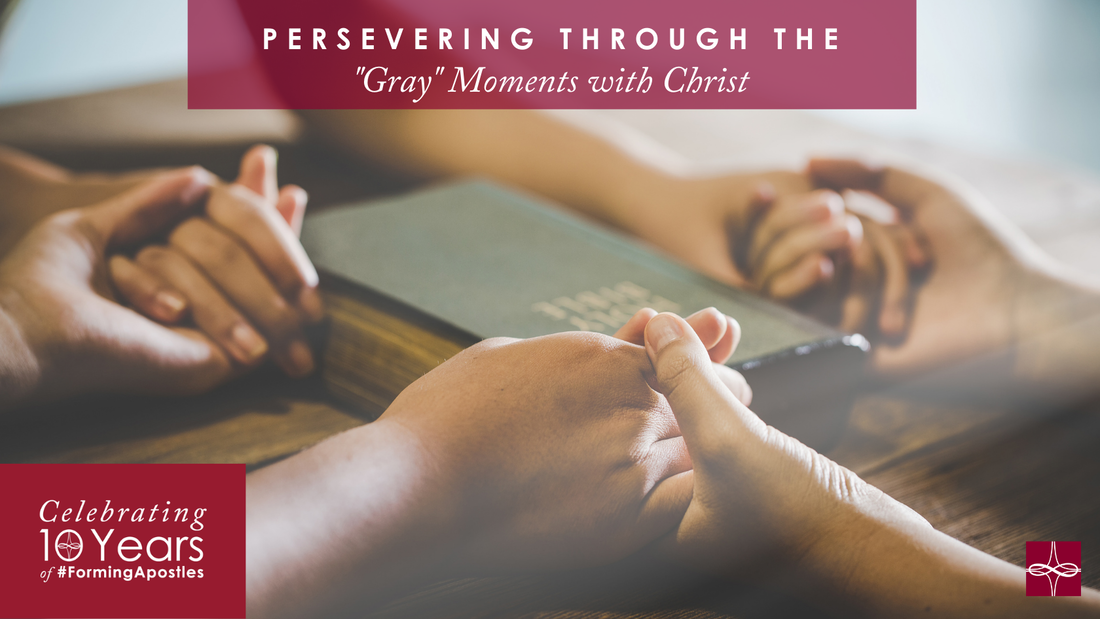

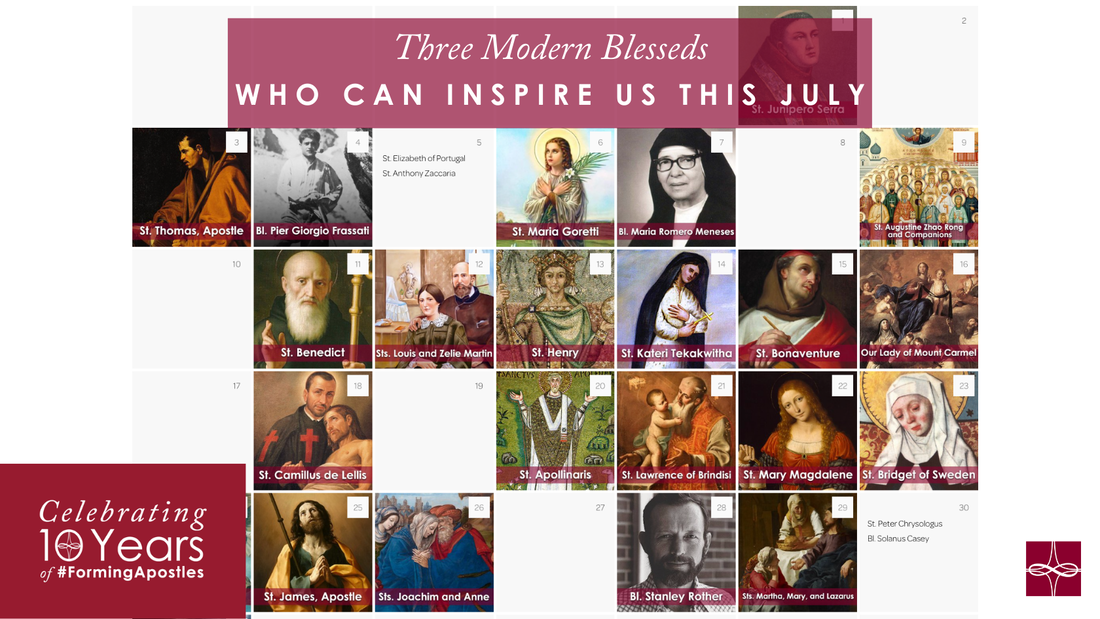




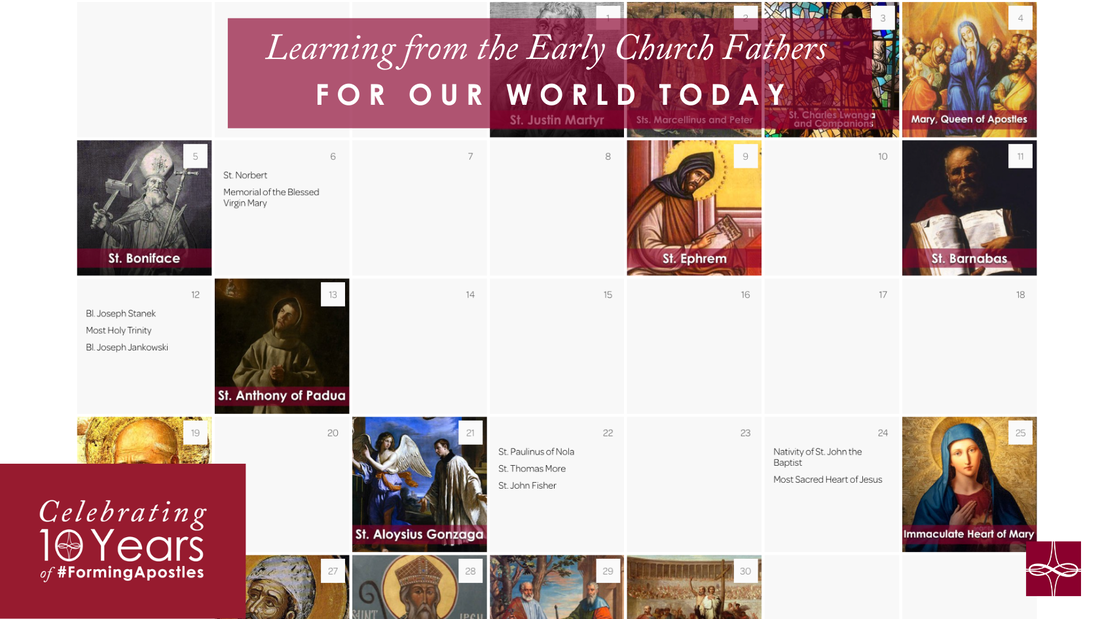


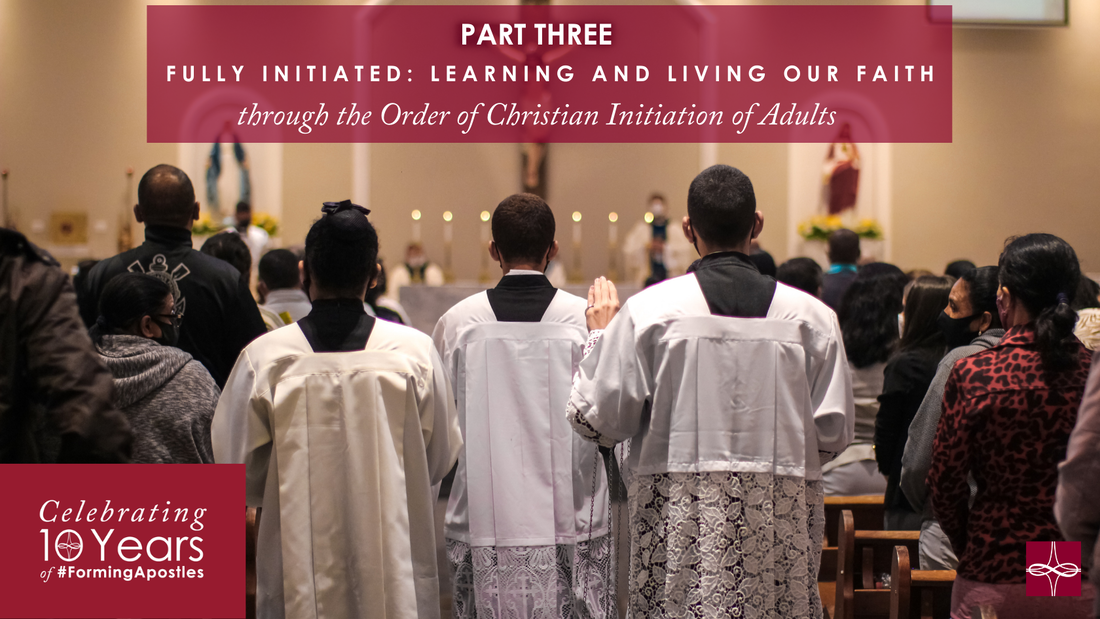





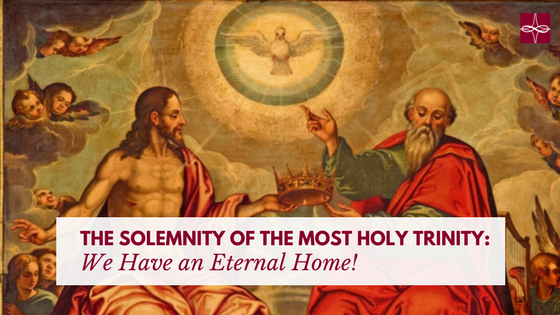

 RSS Feed
RSS Feed